Graham Potter became the 13th managerial departure of the 2022/23 Premier League season (12th to be sacked) following his dismissal at Chelsea on Sunday.
His sacking came on the same day that Brendan Rodgers was fired by Leicester City.
The Blues had paid a world-record fee to lure Potter away from Brighton, but sacked him after just 206 days.
In this article, FootballOrbit looks at why Chelsea were wrong to appoint Potter right from the start.
Graham Potter left Brighton & Hove Albion on the 8th of September 2022, after Chelsea paid a £21.5m compensation fee for him.
The English coach had spent 3 full seasons at Brighton, where he had turned the Seagulls from relegation contenders into challengers for European football.
Brighton secured their highest-ever top-flight finish (9th) in Potter’s last season at the helm. They were a tough side to beat under his stewardship and played attractive football.
Indeed, he exceeded expectations at a club that doesn’t have the resources to compete with the top six.
Arrival at crises-striken Chelsea
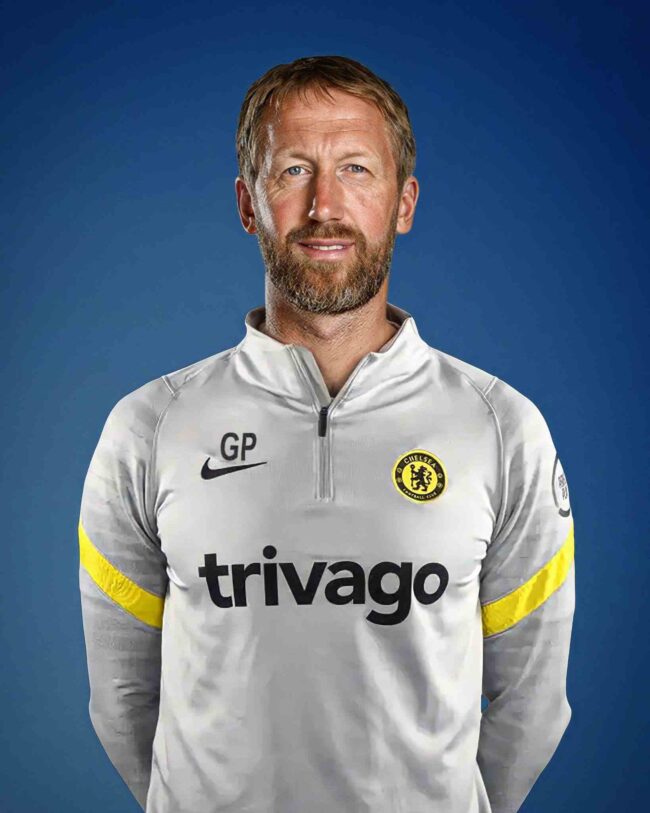
Potter’s arrival at Chelsea was expected to usher in a new era of stability at the club after a period of chaos.
After Russia’s invasion of Ukraine in February 2022, the UK government sanctioned then-owner Roman Abramovich over alleged ties to Russia President Vladimir Putin — which effectively forced Chelsea to be sold.
A Todd Boehly-led consortium completed a £2.5 billion takeover of the Blues at the end of May 2022.
In the summer transfer window, the new owners embarked on a spending spree, splashing £270 million to sign players — the 2nd-biggest outlay ever by any side in a single window.
But, manager Thomas Tuchel was sacked less than a week after the window closed following an internal 100-day review conducted by Boehly and co that analysed all aspects of the club.
Barely 24 hours after Tuchel’s exit, Graham Potter was brought in. The Englishman was identified as a progressive and innovative manager capable of leading a long-term strategy.
The new owners were so convinced of his potential that they paid a world-record compensation package of £21.5m ($26.3m) to prise him away from Brighton.
They believed he was the best fit for the framework they were putting in place. He would synergise with the new ownership group’s blueprint for recruitment and style.
Furthermore, the backroom staff was overhauled and plans were initiated to renovate Stamford Bridge.
In handing Potter a 5-year contract, Boehly and Behdad Eghbali showed that long-term stability was at the core of their strategy. They were trying to move on from the hire-and-fire culture that defined the club under Abramovich’s 19-year ownership.
New signings were given long-term deals, reinforcing the idea that a lasting core was being built around young talent.
In January, Mykhailo Mudryk was given an 8½-year contract following his £88.5m move from Shakhtar Donetsk, while Benoit Badiashile signed a 7½-year deal when joining from Monaco amongst others.
Hell at Stamford Bridge!
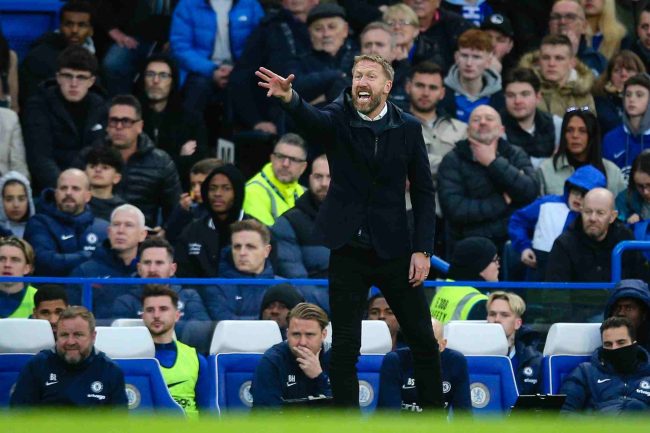
Potter made a strong start at the club, winning 6 of his first 9 games in charge and remained unbeaten.
A 4-1 defeat to former club, Brighton, in his 10th match in November was the beginning of his troubles, with the 47-year-old struggling to get his team back on track thereafter.
Six(6) games without a win across late January to the end of February raised pressure on the manager, who then revealed that his family had received death threats.
Ahead of the Champions League round of 16 second leg against Borrusia Dortmund, Potter knew that his job was on the line……
…….the team managed to scale through to the quarterfinals though, winning 2-1 on aggregate.
Fans may have been hoping that 3 consecutive victories against Leeds, Leicester City and Borussia Dortmund were a sign of things changing at the club, but a draw against Everton and the subsequent defeat to Aston Villa suggested otherwise.
Todd Boehly and co had seen enough! Their huge gamble had backfired in spectacular fashion!! Time to take action!!!
On Sunday 2nd of April 2023, Graham Potter was sacked after less than 7 months (and just 31 games) in charge.
His departure came just 206 days after he was appointed at Stamford Bridge.
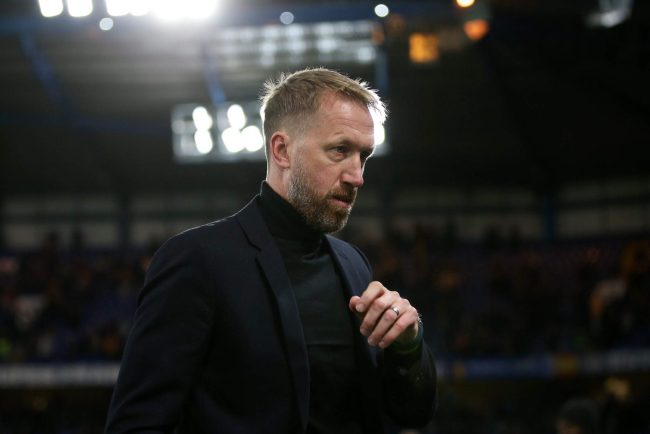
Some of the reasons why Graham Potter failed at Chelsea
1. Lack of adequate preparation
Making the giant step from Brighton to Chelsea means Potter needed time to mould his new players in his own image.
But he didn’t even have a full pre-season to work with his squad. There was no time spent with players to understand them and this made a huge difference whenever he picks his team.
On the day of his official unveiling, Queen Elizabeth II died, and the club postponed their proposed media conference in a show of respect to the late monarch.
Subsequently, Premier League games were cancelled as the nation entered a period of mourning.
What followed was a run of 13 matches in 43 days and yet again, the players left for the 2022 FIFA World Cup in Qatar.
These really saw Potter struggle to stamp his authority on the team.
2. Unable to handle too many star players
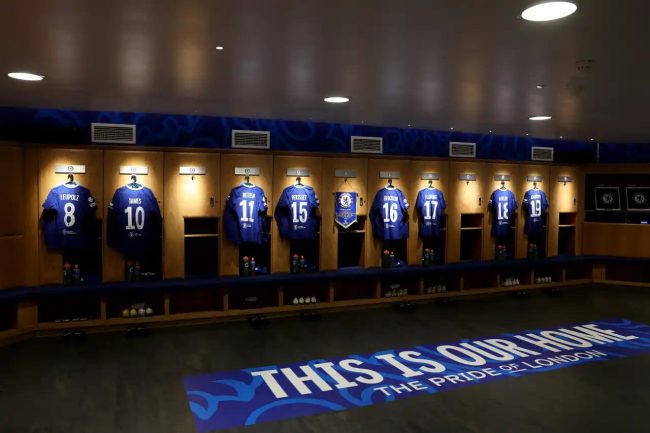
Chelsea had 31 first-team players in their squad by February 1, following another huge spending spree in January that took the overall Boehly-Clearlake era spending beyond £550m.
The calibre of the players now at his disposal only made Graham Potter’s lack of experience at the highest level become more glaring.
Having never handled such a big squad of stars before, the manager struggled to control the egos in the dressing room. He equally made costly mistake as regards that aspect.
Equally, he made poor judgment in a series of selection decisions. For example, Hakim Ziyech travelled to France without the club’s permission in hopes of joining PSG in January, only for a clerical error to scupper the deal.
Bizarrely, Ziyech started the next game against Tottenham. He was only lucky not to get sent off after an ill-tempered first half showing.
Potter eventually substituted the winger in the 62nd minute with Chelsea 1-0 down, but opted to bring on defensive midfielder, Denis Zakaria, in his place instead of another attacker to search for an equaliser!
The Blues would go on to lose the game 2-0 to their equally struggling London rivals.
Many players appreciated Graham’s personal approach and found him likeable, warm and engaging.
But as results began to slide, there were concerns among senior players that reversing the decline was beyond the inexperienced coach’s capabilities.
Moreso, scoring goals was a major issue — Chelsea scored just 29 times in the Premier League this season, less than all the teams in the top half of the table — yet Potter continued to exclude his only natural striker, Pierre-Emerick Aubameyang, from the matchday squad.
Graham Potter had a talented squad at his disposal, but lacked the credentials and personality to make it work.
There was always going to be a problem with a squad of World Cup and Champions League winners. Top players want a manager of a similar status to themselves — earned either by achievements as a player or as a coach.
3. Injuries
This is something out of the manager’s control. N’golo Kante was sidelined from August till March, Reece James picked up one injury after the other, Christian Pulisic was mostly unavailable and Thiago Silva got sidelined more than usual.
Graham Potter was extremely unlucky to inherit a squad full of injury-prone players but still, even the players who deputised for the injured ones are surely good enough to beat the likes of Everton, Crystal Palace, Southampton and Aston Villa.
4. Comparisons with Tuchel
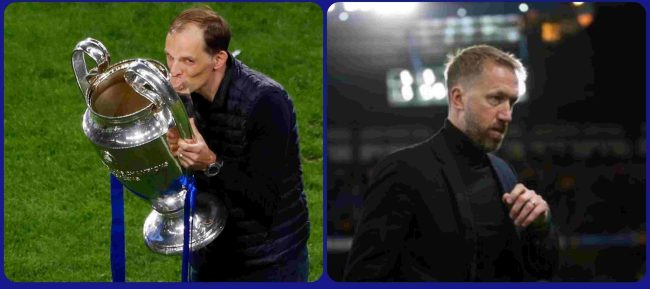
Graham Potter was the total opposite of Thomas Tuchel.
The German had won numerous trophies in his career — including two Ligue 1 titles, a French Cup, German Cup, UEFA Super Cup, FIFA Club World Cup and a UEFA Champions League from his time at Borussia Dortmund, PSG and Chelsea.
On the other hand, Potter had only won the Svenska Cupen (a Swedish domestic cup) in his career.
The owners’ decision to sack Tuchel just 6 games into the 2022/23 season was unfathomable.
The Blues started badly after a major summer overhaul, but Tuchel needed more time to integrate the new signings to the squad. Had he been given more time, he would have steadied the ship.
After all, he won the Champions League title less than 5 months after joining the club. He added the UEFA Super Cup and FIFA Club World Cup to his trophy haul in his only full season in charge.
Additionally, Tuchel also guided Chelsea to three other cup finals and back-to-back Top Four finishes in the Premier League. He was also loved by the fans due his passion and touchline antics.
With all due respect, Graham Potter is a good manager; but lacked the kind of highest level experience and tactical brilliance as his predecessor.
The soft-spoken Englishman also doesn’t posess the charisma of an elite manager.
5. Graham Potter’s mediocre tactics
Throughout his tenure, Potter never seemed sure of his starting eleven. He experimented with different systems, formations and regularly rotated players — resulting in maddening inconsistency.
Although he was battling with injuries, numerous new signings and an over bloated squad; his lack of clarity made it difficult to understand his ideas and tactics.
He had enough time now to implement his preferred system and build a first XI.
Instead, he was always chopping and changing in an effort to find a solution to end Chelsea’s problems — and ultimately failed to improve the team.
This was even evident in his last game in charge against Aston Villa, where he started full-backs, Reece James and Marc Cucurella, either side of Kalidou Koulibaly in a 3-man defence.
Astonishingly, centre-backs, Benoit Badiashile and Trevoh Chalobah, were both on the bench; while midfielder, Ruben Loftus-Cheek, was deployed in James’ usual spot at right-wing back!!!
Again-and-again, Graham Potter’s lack of game reading abilities got exposed, making it obvious that he was doomed to fail at Chelsea.
The Blues would dominate possession, fail to score and then concede cheap goals.
It happened severally. The defeat to Aston Villa in his last game was a classic example: 27 shots, 8 on target, 2.09 expected goals (XG) and 69% ball possession — but Chelsea still lost 2-0!
6. Fan anger
Still struggling to overcome the departure of Thomas Tuchel, Chelsea fans never got on well with Graham Potter.
They regularly voiced their anger in increasing numbers during games.
Potter is not the kind of coach that jumps, yells, moves, runs on the sideline like a Tuchel, Conte, Klopp, Guardiola or even Mourinho. His style is boring and his credentials average.
At Östersund, Potter managed 249 matches, won 127, drew 60 and lost 62 — recording 51.0% winning percentage.
At Swansea, he managed 51 games, won 21, drew 11 and lost 19 — with 41.2% winning percentage.
At Brighton, he oversaw 135 matches, won 42, drew 46 and lost 47 — managing 31.1% winning percentage.
For a Chelsea fan base that have grown accustomed to big personalities and winners like Jose Mourinho, Antonio Conte and Tuchel as managers; Potter never had the persona to succeed at Stamford Bridge.
“You don’t know what you’re doing”
Fans sang to Potter during the defeat to Aston Villa and booed the team off at full-time!
7. Laid-back approach
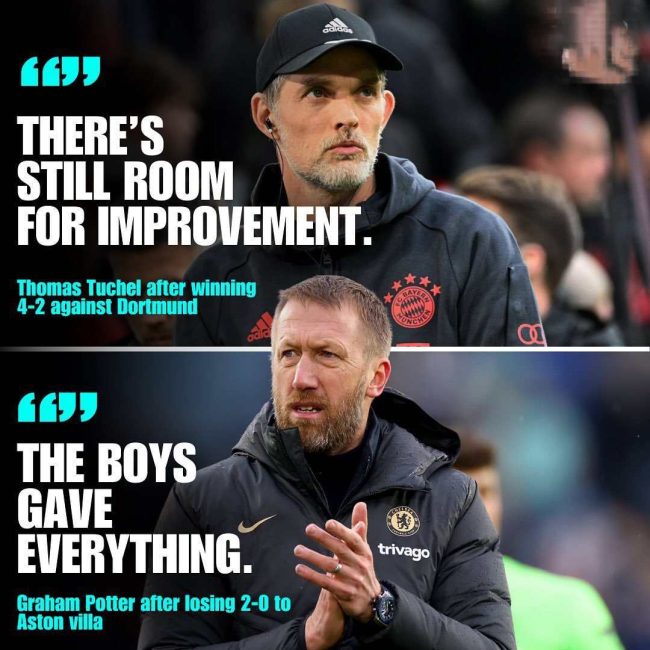
Graham Potter’s public comments dismayed supporters, as the coach often insisted that players had performed to an acceptable level — even in defeat.
“The players gave everything today, as much as we’re all disappointed with the result,” “The attack was there. The scoreline is painful for us. The players are honest. They want to do better. We’re there fighting for each other, fighting together. There’s no complaints about how the supporters respond.”
Potter said after losing to Villa.
Sometimes, he seems out of touch with reality, relying on data and stats — like he remarked after the Villa match that:
“If you look at the [expected goals] of [John] McGinn’s goal, it’s not that big a chance.”
REALLY?!!!
Graham Potter’s record at Chelsea
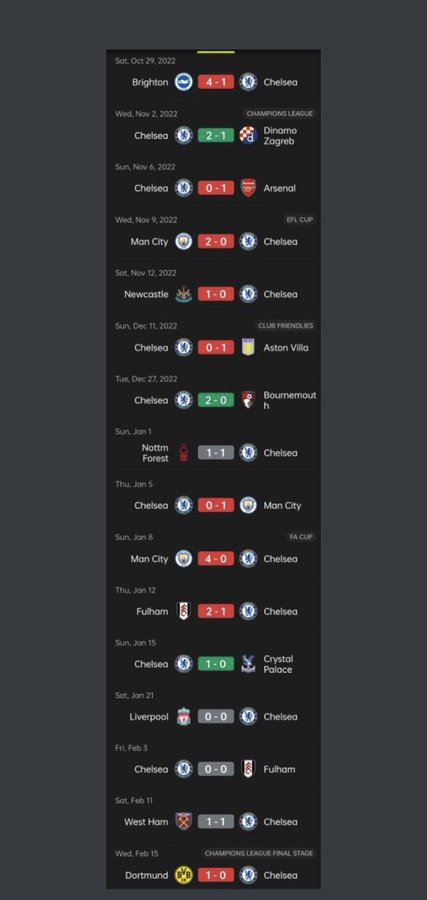
Across his 22 Premier League games as Chelsea manager, Potter averaged just 1.27 points per game — the joint-lowest points-per-game return of any manager to take charge of 20+ games for Chelsea in the Premier League alongside Glenn Hoddle.
When he took over, Chelsea were sitting 6th on the Premier League, but he left them in 11th position — 12 points below 4th-placed Manchester United.
Chelsea recorded 11 defeats, 8 draws and just 12 victories in 31 games during the 47-year-old’s ill-fated reign at Stamford Bridge.
Furthermore, they secured 4 wins, 4 defeats and 4 draws in Potter’s last 12 games in all competitions.
It is a surprise that the manager even lasted so long.
His spell at Chelsea (206 days) was the shortest of any manager at the club — even shorter than Luiz Felipe Scolari’s spell between July 2008 and February 2009.
Scolari lasted 223 days as Chelsea manager, but even he had a superior record to Potter’s at the club in the league; averaging 1.96 points per game before his sacking.
Potter is the 2nd worst Chelsea manager ever, with a win percentage of 38% — only Guus Hiddink [in his second spell] posted a lower number (37%).
Conclusion
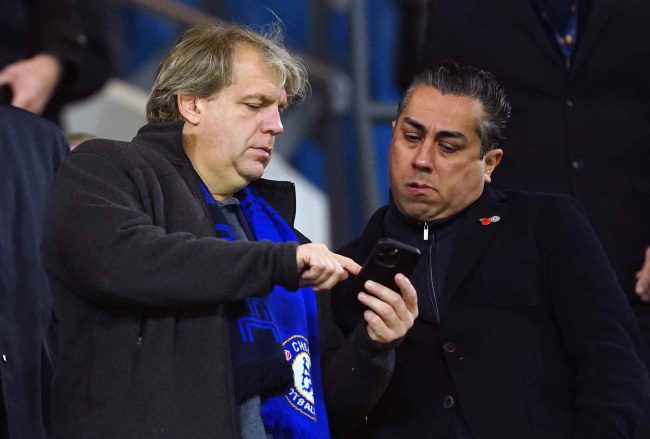
It was painfully obvious from the start that Graham Potter was not the right fit at Chelsea due to his lack of experience at the highest level of football.
There was a huge contrast between what he had done at Brighton and what he was asked to do at Chelsea. He was simply not ready to make the big leap from Brighton to Chelsea.
Indeed, he was regarded as a rising star in coaching following his slells at Ostersund in Sweden, Swansea and Brighton. But he was, perhaps, overhyped by virtue of him being an English coach in the Premier League.
He guided Brighton to 15th, 16th and 9th finishes in his three full Premier League seasons at the Amex Stadium, but his efforts already look set to be eclipsed by his successor, Roberto De Zerbi.
Brighton have gone from strength to strength since Potter left and are now even above Chelsea on the EPL table.
This questions the narrative that the Seagulls were a small team who overachieved due Graham Potter’s brilliant managerial skills. It now looks more like he was holding Brighton back rather than dragging them up.
So it’s hard to see what made Potter — a man with no Champions League experience as a player or coach — so appealing to Todd Boehly and his team.
Much was expected from Potter at Chelsea and the owners gave him (enough?) time, but he failed to succeed at Stamford Bridge.
Evidently, Boehly and Eghbali sincerely wanted Potter’s appointment to work. They were determined to see him succeed, but it proved to be too much to ask of the Englishman.
The owners’ biggest mistake was sacking Thomas Tuchel in September. The second was appointing Graham Potter to replace the Champions League-winning coach at Stamford Bridge.
Interestingly, Bayern Munich wasted no time in bringing Tuchel on board after firing Julian Nagelsmann — who is now among the favourites to be the next Chelsea manager!!


